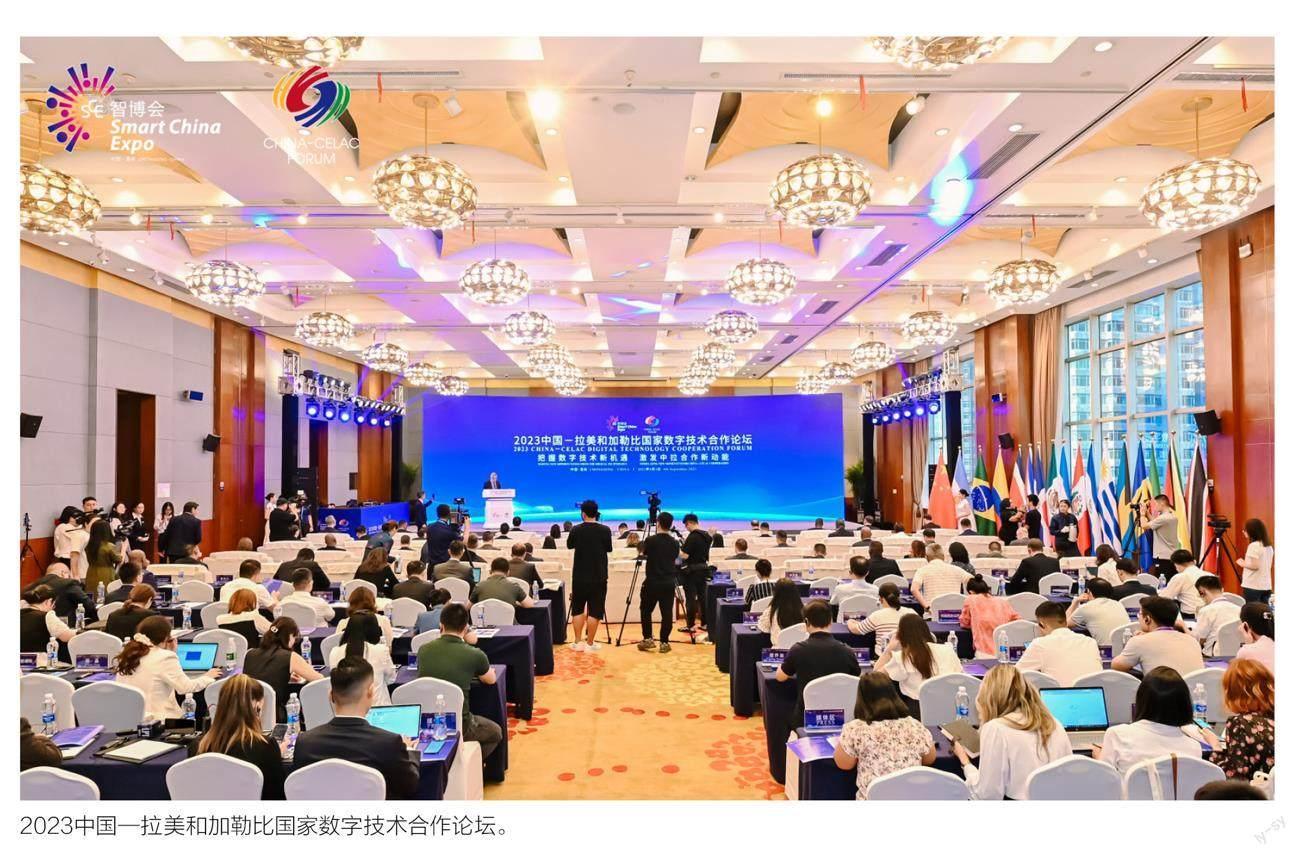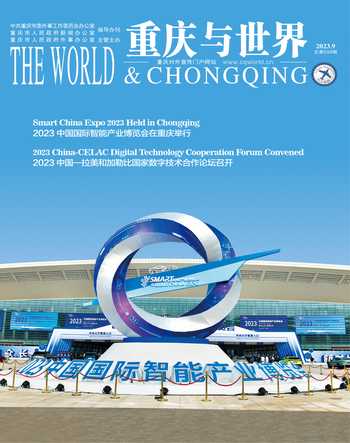2023中国—拉美和加勒比国家数字技术合作论坛召开 探索数字合作“蓝海”共建“数字丝绸之路”

2023 China-CELAC Digital Technology Cooperation Forum Convened:
Exploration of the Digital Cooperation “Blue Ocean” and Co-Creation of the “Digital Silk Road”
On September 4, the 2023 China-CELAC Digital Technology Cooperation Forum was held in Chongqing. With the Theme of “Seizing New Opportunities from the Digital Technology, Stimulating New Momentum for China-CELAC Cooperation”, the Forum, as one of the professional forums held by Smart China Expo 2023, aims to build consensus among all parties, jointly explore the “blue ocean” of digital technology cooperation, continuously deepen the cooperation between China and CELAC in digital technology, and work together to build the “Digital Silk Road”.
This forum brought together more than 160 participants, including representatives from relevant departments and embassies in China from 16 countries in Latin America and Caribbean regions, such as Argentina, Uruguay, the Bahamas, and El Salvador. Other attendees included journalists, representatives from the Chinese Academy of Social Sciences, and well-known Chinese enterprises. The participants actively engaged in sharing ideas and providing suggestions on various topics, including digital infrastructure development, digital technology and its applications, nurturing digital technology talent, and international cooperation and exchange. They also collaboratively explored the growth potential of emerging sectors like the digital economy, aiming to promote mutually beneficial and win-win digital economic and trade cooperation. The Forum released the China-CELAC Digital Technology Cooperation Forum Chongqing Initiative.
The forum is hosted by the Ministry of Industry and Information Technology of the People’s Republic of China (MIIT) and the Chongqing Municipal Government. The organizers include the Foreign Affairs Office of the Chongqing Municipal Government, the Chongqing Municipal Commission of Economy and Information Technology, the Chongqing Yuzhong District Government, and the China Academy of Information and Communications Technology (CAICT). The co-organizer is the Chongqing Institute of Telecommunications (West Institute of CAICT).
Consensus Reached in Response to New Digital Trends Through Scientific and Technological Collaboration
New technologies and innovative business formats, such as digital technology and artificial intelligence, have become crucial drivers for all economies to achieve economic and social development. They also present favorable opportunities for the “Global South”, including China and Latin America and Caribbean regions, to seize and pursue common development.
Zhang Yunming, Vice Minister of the MIIT, stated in his speech that China’s digital economy has gained significant momentum and has become a powerful catalyst for transforming its development mode, optimizing its development structure, driving its development impetus, and enhancing its development quality. In 2022, China’s digital economy exceeded RMB50 trillion, ranking second in the world.
Mr. Zhang proposed leveraging the Belt and Road Initiative (BRI) to enhance the complementarity of technological and industrial advantages between China and CELAC countries at an accelerated pace. This includes promoting the joint development and sharing of information resources in new infrastructure projects, advancing the application of digital technology in manufacturing, education, healthcare, agriculture, and other sectors, fostering the development of digital technology talent, and expanding the scope and depth of China-CELAC digital technological cooperation through initiatives like joint laboratory establishment.
Daniel Filmus, Minister of Science, Technology, and Innovation of Argentina, expressed the importance of cooperation with China, stating, “For Argentina, cooperation with China is crucial, and we hope for more harmonious collaboration with China.” He also mentioned that Argentina is formulating an innovation strategy to promote the development of national science and technology. Filmus hopes to foster digital technological cooperation between Argentina and other countries, applying scientific and technological advancements in agriculture, healthcare, education, manufacturing, and other sectors. The goal is to empower agricultural and animal husbandry industries and enhance the added value of relevant products.
“Through this forum, we anticipate significant progress in key areas of cooperation such as infrastructure, digital technology, digital solutions, digital transformation, cybersecurity, and digital talent”, said Wayde Watson, Parliamentary Secretary for the Ministry of Economic Affairs of the Bahamas, in his speech. He expressed his desire to seize digital development opportunities through cooperation, innovation, and experience sharing.
Wayde Watson acknowledged Chongqing as a technology innovation hub and expressed the Bahamas’ interest in establishing its own ecological technology system, drawing inspiration from Chongqing’s experience.
Thriving Digital Technology Cooperation Between China and CELAC
The digital economy has emerged as a primary driver of China’s economic growth and a key area for promoting international cooperation. China has consistently supported the development of all countries in the digital realm and opposed “technology blockade”, digital iron curtain, and technological hegemony.
Qiu Xiaoqi, Special Representative of the Chinese Government on Latin American Affairs, emphasized the close collaboration between China and CELAC on core interests and major concerns. In their efforts to counter hegemony and interference, and safeguard the common development rights and interests of the “Global South”, China and CELAC have continuously strengthened their foundation of political mutual trust.
Currently, China’s cloud technology is providing secure, efficient, and cost-effective data storage services to enterprises in Brazil and other countries. The Connected Universal Experiences Labs employ digital simulation technology to support the construction of Buenaventura Port. Additionally, China’s scientific research team has offered data support for ecological environment protection projects in Chile and Ecuador.
Daniel Filmus stated that Argentina has reached a long-term cooperation consensus with relevant departments in China.
Additionally, Uruguay’s high-quality agricultural products, such as beef and dairy products, have been introduced to tens of millions of Chinese consumers through China’s e-commerce platforms.
Omar Paganini, Uruguay’s Minister of Industry, Energy and Mining, emphasized that “China is the top destination for Uruguay’s agricultural exports”. He expressed the desire to enhance cooperation with China in energy conservation and emission reduction, aiming to further reduce carbon dioxide emissions and establish a stronger foundation for future development.
It is reported that 22 CELAC countries have signed Belt and Road Initiative (BRI) cooperation agreements with China. Furthermore, significant progress has been made in free trade negotiations or upgrades between China and countries such as Ecuador, Nicaragua, Honduras, and Peru. In 2022, the trade volume between China and CELAC reached nearly USD500 billion, indicating the closer economic and trade cooperation between China and CELAC.
Dedication to Enhancing the Scope and Intensity of Digital Technology Collaboration
Digital technology cooperation offers vast development opportunities and can involve the participation of all countries worldwide. It contributes to promoting technological and institutional innovation, bridging the global digital divide, and fostering balanced development among nations.
Guo Cunhai, Director of the Department of Social and Cultural Studies and Director of the Center for Argentine Studies at the Institute of Latin American Studies, Chinese Academy of Social Sciences, highlighted the practical achievements of the “Digital Silk Road” in supporting digital infrastructure construction in 22 CELAC countries participating in the BRI. It has also facilitated innovative trade development and enhanced international cooperation in science and technology. Mr. Guo emphasized that in the next decade, joint construction of the “Digital Silk Road” between China and CELAC will unlock new development potential and create fresh opportunities for both sides.
Using examples such as infrastructure construction, sharing economy models, and e-commerce, Mr. Guo pointed out that the Latin America and Caribbean regions are increasingly eager to strengthen digital technology cooperation with China. Recognizing the positive spillover effects of the digital economy in enhancing production efficiency, reducing supply costs, promoting demand structure upgrades, and improving innovation capacity, Mr. Guo urged China and CELAC to seize this opportunity to deepen collaboration and synergy among relevant departments. This will address the mutual needs of both sides for structural reform in the current stage.
“Efforts must be made to ensure inclusive development in our digitalization,” stated Daniel Méndez, Secretary of Innovation of El Salvador. He mentioned that El Salvador has devised specific projects with medium- and long-term plans in healthcare, education, and other sectors to enhance the digitalization level of society. Méndez expressed his hope for increased learning and exchanges between El Salvador and other countries to achieve a shared vision of a better life.
Cristina Akemi Shimoda Uechi, Acting Director of the Department of Science, Technology and Digital Innovation of Brazil’s Ministry of Science, Technology and Innovation, expressed the desire to create a more prosperous and Inclusive future for all by strengthening digital technology cooperation.
Esteban Zottele, a researcher at the China-Veracruz Studies Center at the University of Veracruz in Mexico, highlighted the relatively low management level and high bankruptcy rate of micro, small, and medium enterprises (MSMEs) in the Latin America and Caribbean regions. He emphasized the need to assist these MSMEs through internationalization, digital means, and e-commerce development. Zottele believes that the digital wave presents new opportunities for traditional trade, enabling countries to engage in “global buying and selling”.
He also emphasized, “Today, China is the second largest trading partner in Latin America and the Caribbean”. Zottele expressed a strong desire to further promote economic and trade exchanges and connectivity between China and the Caribbean, as well as relevant cooperation in the digital field.
Source/Chongqing Daily
Photo/The Host
9月4日,2023中國—拉美和加勒比国家数字技术合作论坛在渝举行。作为2023年智博会举办的专业论坛之一,论坛以“把握数字技术新机遇,激发中拉合作新动能”为主题,旨在凝聚各方共识,共同探索数字技术合作“蓝海”,持续深化中拉数字技术合作,共建“数字丝绸之路”。
来自阿根廷、乌拉圭、巴哈马、萨尔瓦多等16个拉美和加勒比国家有关部门、驻华使馆、记者和中国社会科学院、部分国内知名企业等160余人齐聚重庆,围绕数字基础设施建设、数字技术与应用、数字技术人才培养及国际合作交流等多个议题积极建言献策,合力探索挖掘数字经济等新兴领域增长潜力,推动互利共赢的数字经贸合作。论坛发布了“中国—拉美和加勒比国家数字技术合作论坛重庆倡议”。
论坛由工信部、市政府主办,市政府外办、市经信委、渝中区政府、中国信息通信研究院承办,重庆信息通信研究院协办。
以科技合作应对数字化新趋势已成共识
当下,以数字技术、人工智能为代表的新技术、新业态成为各国实现经济社会发展的强大支撑,也为包括中国同拉美和加勒比国家在内的“全球南方”国家抢抓机遇、共谋发展创造了有利契机。
工业和信息化部副部长张云明在致辞中表示,我国数字经济发展势头强劲,成为转变发展方式、优化发展结构、转换发展动力、提升发展质量的强大引擎。2022年,我国数字经济规模突破50万亿元,总量居世界第二。
他建议,以共建“一带一路”为契机,加快中拉技术和产业优势互补,持续推动新型基础设施建设和信息资源共建共享,共同推动数字技术在制造、教育、医疗、农业等领域应用,深化数字化技术人才培养,通过共同打造实验室等多种方式,拓展中拉数字技术合作广度、深度。
“对阿根廷来说,与中国的合作是至关重要的,我们希望和中国开展更多合作。”阿根廷科技创新部部长丹尼尔·菲尔穆斯表示,阿根廷正在制定促进国家科技发展的创新战略,希望促进阿根廷与其他国家的数字化技术合作,进一步把科学技术发展应用于农业、医疗、教育、制造业等各个领域,为农业畜牧业赋能,提高相关产品的附加值。
“通过此次论坛,我相信我们会在重点合作领域取得长足进展,比如基础设施、数字化技术、数字化解决方案、数字化转型、网络安全以及数字化人才方面。”巴哈马经济事务部议会秘书韦德·沃森在致辞中表示,希望通过合作创新、经验共享,进一步把握数字化发展机遇。
韦德·沃森直言,重庆是一个技术创新高地,巴哈马正在尝试建立本国的生态技术系统,可以学习借鉴重庆经验。
中拉数字技术合作蓬勃发展、方兴未艾
数字经济已成为推动中国经济增长的主要引擎之一,也是促进国际合作的重点领域之一。一直以来,中方支持各国在数字“大舞台”百花齐放,反对“技术封锁”、数字铁幕、科技霸权。
中国政府拉美事务特别代表邱小琪在致辞中表示,中拉双方在涉及彼此核心利益和重大关切问题上密切配合,在反霸反干涉、维护“全球南方”国家共同发展权益的过程中携手并肩,中拉政治互信基础不断夯实。
当前,中国云技术正在为巴西等国企业,提供安全、高效、低成本的数据存储服务;中国—哥伦比亚智网互联实验室,利用数字化仿真技术,助力布埃纳文图拉港口建设;中国科研团队还为智利和厄瓜多尔的生态环境保护项目提供了数据支持。
丹尼尔·菲尔穆斯表示,阿根廷已和中国相关部门开展长期合作,且达成相关共识。
此外,乌拉圭牛肉、乳制品等优质农产品,也已借助中国电商平台走进千万中国寻常百姓家中。
“中国是乌拉圭农业出口排名第一的目的地国。”乌拉圭工业、能源和矿业部长奥马尔·帕加尼尼表示,希望加强与中国在节能减排等领域的合作,进一步降低碳排放,为未来发展奠定更为坚实的基础。
据悉,22个拉美和加勒比国家同中国签署了“一带一路”合作文件,中国同厄瓜多尔、尼加拉瓜、洪都拉斯、秘鲁等国自贸谈判或自贸升级均取得重要进展。2022年,中拉贸易额逼近5000亿美元大关,中拉经贸合作纽带日益紧密。
致力于拓展数字技术合作广度深度
数字技术合作有着广阔的发展空间,容得下世界各国共同参与。数字技术合作,有利于推动科技与制度创新,缩小全球数字鸿沟,促进各国平衡发展。
“‘数字丝绸之路’在服务拉美22个共建‘一带一路’倡议国家的数字基础设施建设、推动贸易创新发展、促进科技国际合作等方面,取得了务实成果。”中国社会科学院拉丁美洲研究所社会文化研究室、阿根廷研究中心主任郭存海表示,从未来十年来看,中拉共建“数字丝绸之路”将为双方释放新的发展潜能、开辟新的空间。
他以基础设施建设、共享经济模式、电子商务为例指出,拉美地区与中国加强合作的意愿日趋强烈。鉴于数字经济在提振生产效率、降低供给成本、促进需求结构升级、提高创新能力等方面释放的正向外溢效应,中拉双方应该抓住这一机遇,推动相关部门深入对接合作,以满足双方现阶段结构性改革的共同需求。
“要努力保证我们的数字化实现包容性发展。”萨尔瓦多总统府创新国务秘书丹尼尔·门德斯表示,萨尔瓦多已经制定了一些涉及医疗、教育等领域的中长期规划和具体项目,希望提高整个社会的数字化水平。未来,他希望和其他国家开展更多学习交流,一起实现美好的生活愿景。
巴西科技创新部数字科技创新司代理司长克里斯缇娜·阿克米·斯摩达·维希·索萨表示,希望通过加强数字技术合作,为所有人创造更加繁荣和包容的未来。
“拉美和加勒比地区的中小微企业管理水平相对较低,破产率非常高,需要通过一系列国际化、数字化手段,以及发展电子商务,来帮助这些中小微企业。”墨西哥维拉克鲁斯大学“中国—维拉克鲁斯研究中心”研究员斯蒂文·索特雷认为,数字化浪潮为传统贸易提供了全新机遇,让各个国家可以实现“买全球、卖全球”。
“如今,中国是加拉地区的第二大贸易合作伙伴。”斯蒂文·索特雷强烈希望,进一步促进中国和加勒比地区之间的经贸往来及互通互联,以及在数字领域的相关合作。
文/重庆日报
图/活动主办方提供

